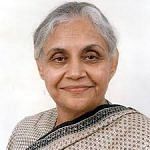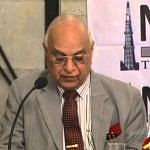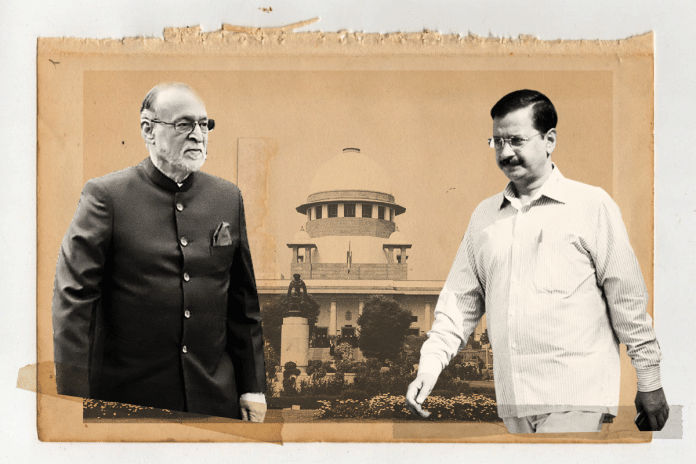The Supreme Court today outlined the scope of the L-G’s power with respect to administration of Delhi.
The Aam Aadmi Party (AAP) and the centre, which appoints the L-G, have been at loggerheads over the issue for more than three years now. The court’s verdict is being touted as a victory for the AAP.
ThePrint asks: Can Delhi expect governance instead of confrontation after the Supreme Court verdict?
Congress, BJP should let AAP government function & desist from rumour-mongering
 Ashutosh
Ashutosh
Spokesperson, AAP
The question itself seems to be loaded. It assumes that the reason for the fight in Delhi lies with the AAP. No, it’s an absurd narrative which the BJP and the Congress had been trying to build.
Before the emergence of the AAP, Delhi was ruled by both the parties. The Congress ran the Delhi government for three consecutive terms. There was a time when the Congress looked unbeatable. But now, it has no MLA left in the assembly and no MP from Delhi in Parliament.
The BJP is also reduced from 31 MLAs in 2013 to three in 2015. They have an obvious grudge and have displayed it with vengeance. After the Supreme Court verdict, both parties should let the AAP government function and desist from rumour-mongering.
In Delhi, the AAP is the victim of a fascist regime. The AAP had proved in 2015 that Modi is not invincible. He could be defeated, that too by a small party. He could not bear the humiliation. So, he decided to strangulate a duly elected government. The L-G’s office was used to kill the people’s mandate. The police commissioner was used to traumatise AAP leaders and the chief minister’s office was also raided. The CM himself was interrogated on fictional charges. The Income Tax department, the ED and the CBI were let loose. The list is endless. The AAP was only responding to these charges, and had no interest in indulging in any kind of fight with the central government, which is too powerful.
Once attacked, the AAP had no option but to fight back.
Today, after the SC order, the AAP stands vindicated. The L-G has no power except on three subjects – police, land and public order. Now, it has to act as the titular head on other subject matters. And if the Modi government has learnt its lesson and decides not to suppress the AAP government in Delhi, there is no scope for any fight. But if it decides otherwise, then what can one do except defend oneself.
Would like to see what work has Arvind Kejriwal done in the last 4 years
 Sheila Dikshit
Sheila Dikshit
Former chief minster, Delhi and senior Congress leader
The confrontation between the L-G and the CM is never a sign of good governance. Confrontations are not conducive to governance. Any government in Delhi needs to remember that it is not only a city but also the national capital.
I would like to see what work has been done by Arvind Kejriwal in the last four years. There has been talk and hardly any governance.
When you are elected, the people give you the mandate to govern. You have been given an opportunity to show that you are dedicated to governance more than anything else. As an elected representative that is what you should focus on.
My party also worked with a different government at the Centre. It was very simple – either we convinced them about the worth of our decision, or they convinced us about the worth of theirs. Politics is about compromise and learning to negotiate in tough situations. It isn’t about throwing in the towel.
It is important to spell out your needs, and work together. For Delhiites, this never happened in the last four years. What one expects of a chief minister and his cabinet wasn’t fulfilled by Arvind Kejriwal. A government in Delhi, whether it is the AAP or anyone else, has its own share of responsibilities and powers. It would have been better to focus on those rather than blaming others.
The Supreme Court always gives a rational decision. I now hope the blame games will end, and governance will finally begin.
Kejriwal is celebrating a victory that is only in his mind
 Nalin Kohli
Nalin Kohli
Spokesperson, BJP and Supreme Court lawyer
Whether or not the AAP will now govern is something they have to decide. Let us understand the verdict first.
The Constitution was amended in 1992 to insert Article 239 (AA), making Delhi the national capital territory of India. Clause 4 of Article 239 (AA) and the proviso of Clause 4 give the L-G the power to refer any matter to the President and take decisions himself in matters of urgency.
The AAP argued that because Delhi has an assembly, it should be treated like a state. The AAP also argued that the L-G should behave like a governor, bound by the aid and advice of the cabinet.
The third argument was that entry 1, 2 and 18 of the state list were taken off and were put in the union list the day the AAP government came to power. But this was never challenged.
It is under these circumstances that different political parties, whether the Congress or the BJP, have worked. There has never been a conflict like this.
The court today essentially did not go into the argument that Delhi is a state. However, Delhi is not a state; it never was and never will be. It is a union territory and a national capital territory. It enjoys a special case.
The L-G has to be shown everything and has to be kept in the loop so that in case something is going wrong, he can alert the President. The L-G, in effect, cannot be excluded because of Clause 4 of Article 239 (AA). The argument regarding exclusivity of the executive’s decision is rejected.
If this is being touted as a victory for the AAP, I can only tell you that for Kejriwal, any victory is a state of mind. You can believe that you are victorious in anything. He is the one who entered the L-G’s house, staged a dharna and claimed it a victory. Nobody asked him to go there.
Kejriwal calls himself an anarchist. The Constitution is as it was before he came; this is how the past governments have functioned.
This is also the basis on which he is supposed to work. If he chooses to not work and believes that the court can give him more power than the Constitution can provide, he is entitled to celebrate the victory that is in his mind, just as someone else is entitled to believe that poverty is a state of mind.
Judgment is vague on several issues, creates more confusion
 Subhash Kashyap
Subhash Kashyap
Former secretary-general, Lok Sabha and author of Our Constitution: An Introduction to India’s Constitution and Constitutional Law
I doubt if the politics of confrontation will end. I haven’t yet seen the text of the judgment but from what I gather it seems to be vague on several issues. As a matter of fact, it creates more confusion than it provides clarity.
The basic thing is that the institutions of the state, whether the legislature or the chief minister and his cabinet, have to act in the spirit of cooperation and not confrontation. If the chief minister and the governor are at loggerheads, state administration cannot function.
So far as the Constitution is concerned, Delhi is a union territory. It is administered by the Union. That is the strict constitutional position. The Supreme Court hasn’t taken a clear stand on the issue. The majority of the judgment as reported doesn’t seem to declare the law as it is expected to.
The real question that has been raised is regarding the confrontationist attitude and the lack of cooperation. The fact that it is being touted as a victory for the AAP is pure politics.
Generally, the elected government’s advice is acceptable to the governor. But if the governor or the L-G has serious reservations about an issue, there is nothing the chief minister can do about it. There is no way out, constitutionally.
If Governor is not acting as per cabinet’s advice, it’s a mockery of the system
 Mohan Parasaran
Mohan Parasaran
Senior advocate, Supreme Court and former Solicitor General of India
The verdict delivered by the Supreme Court is in concurrence with constitutional principles. It is a reiteration by the Supreme Court of its own judgment delivered in 1974 in Shamsher Singh’s case.
In the 1997 case concerning the national capital territory with reference to the NDMC, the same principles were evoked. Merely because Delhi is not a state, you can’t say the elected government has to be a puppet government. The governor is the titular head. He is bound to act on the aid and advice of the cabinet. The exception is a situation where he is of the opinion that a particular issue may fall within the ambit of the Union. He can then refer the issue or the bill to the Union government for consultation.
Otherwise, the governor is bound to act as per the advice of the cabinet. If he doesn’t do that we are making a mockery of the system. The people are reduced to the job of only putting a rubber stamp and electing a toothless government. Their vote becomes irrelevant.
The way forward for the Delhi government is to act responsibly now. They can govern Delhi properly like any other state government administration by making proper appointments and choosing persons that they would like, which they haven’t been able to do. They must rule honestly and with transparency.
L-G will keep issues pending on the premise that he needs President’s guidance
 Maneesh Chhibber
Maneesh Chhibber
Editor (Investigations & Special Projects), ThePrint
For a chief minister, whose declared version of how he wants to run Delhi is to do so by being an “anarchist”, Arvind Kejriwal, while overtly hailing the Supreme Court judgment, will now be secretly mulling the next issue on which he can take on the L-G or the centre.
After today’s judgment, governance should be at the top of Kejriwal’s mind. There is no excuse left now.
But, confrontation is the bread-and-butter for his politics, and he can’t hope to survive for long without being able to play the victim card. There are talks that the Delhi government is seeking more funds from the centre – funds that it needs to pay for the essential services since its own funds have been exhausted on its pet projects aimed at its core vote-bank.
Even Narendra Modi, not exactly known for his love of the institutions, isn’t expected to play ball and push Lieutenant Governor Anil Baijal into giving more freedom to the Kejriwal government. Modi won’t allow a court order, even if it is from the top court of the country, to guide his politics.
The Supreme Court judgment has also left too many issues unresolved, including which are the issues that the L-G doesn’t have to refer to the President. In the absence of clarity, the L-G can, let me even stick my neck out and say, will keep issues pending on the premise that he needs the guidance of the President.
The Constitution bench should have cleared the air on this.
But, it chose not to do so. Maybe, the regular bench, which will decide the appeals against the judgment of the Delhi high court on this subject, will do so.
Compiled by Deeksha Bhardwaj, journalist at ThePrint.




Supreme Court judgements are open-ended, both the sides will claim their victory, media will report the verdict basis its own bias and the daily routine shall continue.
Delhi is the Capital of the nation and also the Capital of what all ails the country.
Governance – Are we really serious about it? Do we even know what Governance means?